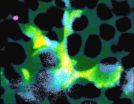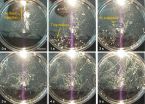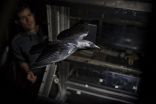Health information causing new mums anxiety
2015-07-02
(Press-News.org) Pregnancy and motherhood are both wonderful and worrisome times - could public health campaigns and social stereotypes be contributing to anxiety for mothers? Researchers from Monash University have identified links between perinatal anxiety and social and health messages that women are exposed to during the perinatal period, the period immediately before and after birth.
In a paper recently published in Women's Studies International Forum, Dr Heather Rowe and Professor Jane Fisher from the Jean Hailes Research Unit within the School of Public Health and Preventive Medicine have examined perinatal anxiety and its causes.
Dr Rowe said that perinatal anxiety disorders are common but much less attention has been paid to anxiety than depression.
"While a degree of anxiety is inevitable at this time in a woman's life, the complexity of modern pregnancy and the postpartum period appears to have a downside, delivering over-simplified public health advice as well as professional and social scrutiny," Dr Rowe said.
The research identified several themes underpinning perinatal anxiety: managing women's 'maternal image'; single-message health promotion campaigns; evidence based decision making; 'maternal instinct'; and the concept of risk. The researchers concluded that health and social messages can be unrealistic and distressing, causing confusion and stigma that can undermine a mother's confidence.
"Public health campaigns with a strict single message such as 'breast is best' can make women feel pressured, and can lead them to feel guilty and ashamed if they make an informed choice not to breastfeed. Similarly the 'Safe Sleep Space' campaign to prevent SIDS can cause parents to over-estimate the likelihood of SIDS and lead them to be excessively watchful and worried," Dr Rowe said.
"We need evidence based, public health campaigns and non-judgemental advice to ensure that women feel supported and know that society values the work of mothering."
The researchers recommend that health professionals address the inaccurate stereotype that mothering is instinctive, which can paint a highly idealised image of how motherhood 'should' be and replace this with the message that caretaking for an infant is a set of learned skills that will develop over time.
"By providing realistic and evidence based information to assist decision making, health professionals can help challenge the unhelpful messages that bombard women in pregnancy and motherhood, and benefit both mother and child," Dr Rowe said.
INFORMATION:
ELSE PRESS RELEASES FROM THIS DATE:
2015-07-02
Unwanted, intrusive visual memories are a core feature of stress- and trauma-related clinical disorders such as posttraumatic stress disorder (PTSD), but they can also crop up in everyday life. New research shows that even once intrusive memories have been laid down, playing a visually-demanding computer game after reactivating the memories may reduce their occurrence over time.
The findings are published in Psychological Science, a journal of the Association for Psychological Science.
"This work is the first to our knowledge to show that a 'simple cognitive blockade' ...
2015-07-02
Spider-like cells inside the brain, spinal cord and eye hunt for invaders, capturing and then devouring them. These cells, called microglia, often play a beneficial role by helping to clear trash and protect the central nervous system against infection. But a new study by researchers at the National Eye Institute (NEI) shows that they also accelerate damage wrought by blinding eye disorders, such as retinitis pigmentosa. NEI is part of the National Institutes of Health.
"These findings are important because they suggest that microglia may provide a target for entirely ...
2015-07-02
A new method for calculating the exact time of death, even after as much as 10 days, has been developed by a group of researchers at the University of Salzburg.
Currently, there are no reliable ways to determine the time since death after approximately 36 hours. Initial results suggest that this method can be applied in forensics to estimate the time elapsed since death in humans.
By observing how muscle proteins and enzymes degrade in pigs, scientists at the University of Salzburg have developed a new way of estimating time since death that functions up to at least ...
2015-07-02
When remembering something from our past, we often vividly re-experience the whole episode in which it occurred. New UCL research funded by the Medical Research Council and Wellcome Trust has now revealed how this might happen in the brain.
The study, published in Nature Communications, shows that when someone tries to remember one aspect of an event, such as who they met yesterday, the representation of the entire event can be reactivated in the brain, including incidental information such as where they were and what they did.
"When we recall a previous life event, ...
2015-07-02
Classical Brownian motion theory was established over one hundred year ago, describing the stochastic collision behaviors between surrounding molecules. Recently, researchers from Technical Institute of Physics and Chemistry, Chinese Academy of Sciences discovered that the self-powered liquid metal motors in millimeter scale demonstrated similar Brownian like motion behaviors in alkaline solution. And the force comes from the hydrogen gas stream generated at the interface between liquid metal motor and its contacting substrate bottom.
Ever since the irregular motions ...
2015-07-02
A group of the world's top doctors and scientists working in cardiology and preventive medicine have issued a call to action to tackle the global problem of deaths from non-communicable diseases (NCDs), such as heart problems, diabetes and cancer, through healthy lifestyle initiatives.
They say that identifying the enormous burden caused by NCDs is not enough and it is time for "all hands on deck" to pursue strategies both within and outside traditional healthcare systems that will succeed in promoting healthier lifestyles in order to prevent or delay health conditions ...
2015-07-02
Sophia Antipolis, 02 July 2015: Patients are experiencing significant delays in access to approved cardiovascular devices due to bureaucratic inefficiencies, reveals a Devices White Paper from the Cardiovascular Round Table (CRT) published today in European Heart Journal.1
There is a clear correlation between declining death rates from cardiovascular disease and the introduction of innovative techniques and devices.1
The CRT is an independent forum established by the European Society of Cardiology (ESC) and comprised of cardiologists and representatives of the pharmaceutical, ...
2015-07-02
Birds that moult at the wrong time of the year could be disadvantaged, according to a study by scientists at Lund University, Sweden. Birds depend on a full set of feathers for maximum efficiency when flying long distances, but the study shows that moulting has a detrimental effect on their flight performance.
The researchers trained a jackdaw to fly in a wind tunnel and measured different types of drag experienced by the bird. "We expected the bird not to be able to glide at the lowest speeds that it could glide at before moult and our results confirmed this", says ...
2015-07-02
Children with Attention Deficit Hyperactivity Disorder (ADHD) may be successfully supported in classrooms through strategies that do not involve drugs, new research has indicated. These children are typically restless, act without thinking and struggle to concentrate, which causes particular problems for them and for others in school.
A systematic review was led by the University of Exeter Medical School funded by NIHR's Health Research Technology Assessment programme and supported by the NIHR Collaboration for Leadership in Applied Health Research and Care South West ...
2015-07-02
Being able to dive is what matters most for seal pups, but how do they learn to do it? Grey seal pups that can play in pools may have better diving skills once they make the move to the sea, and this could increase their chance of survival. Researchers at Plymouth University have found that spending time in pools of water helps seal pups hold their breath for longer.
Many seal species stay on land after they have weaned before they go to sea to feed for the first time. "It is during this period of fasting that access to water can make a difference to diving ability," ...
LAST 30 PRESS RELEASES:
[Press-News.org] Health information causing new mums anxiety



